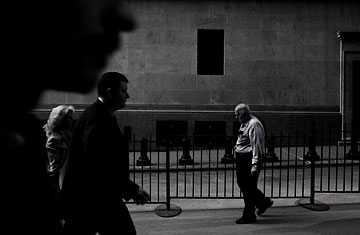
Wall Street, New York City, in September 2008
America is down on itself. That's the thesis of veteran political reporter Dick Meyer's book Why We Hate Us, which charts the ways in which modern Americans have become disillusioned with their government, culture and society. It's easy to dismiss Meyer as a malcontent lamenting a lost time. But in the wake of an economic downturn caused by greed and selfishness, Meyer's 2008 writing looks positively prescient. TIME talked with the author about how his book, due to be re-released in paperback on Sept. 22, might have changed in light of two enormous events — the historic election and the worst recession in decades.
I've seen criticism that argues the title of your book is almost unpatriotic. Why'd you use such a provocative title?
The title actually came partly from a spin-off of a famous cover of Newsweek that ran after 9/11, which was "Why They Hate Us." The title was a little bit of a play on that, to get at the idea that Americans are down on almost all aspects of American public culture. It's not that Americans are down on themselves or on the idea of America or patriotism. What they are down on are politics and banks and stockbrokers. They're down on journalism and journalists. They're down on Hollywood. A lot of what is produced by us, we hate.
How did things devolve to this point?
We have underestimated the amount of social change that we've lived through in the past 40 or 50 years. The first wave of change came with the rebellious spirit of the '60s. We threw off a lot of conventional wisdom. A lot of what we threw away was bad — bias, prejudice, segregation. But a lot of the spiritual and traditional ways Americans used to organize beliefs in their lives were thrown out, and it turned out it was very hard to replace those things.
It's mirrored in a metaphoric way by our geography. Americans rarely stay in the place they were born, with their nuclear families. That's unique in human history. We became nomadic geographically, as well as morally, religiously and ethically. And after all that happened, there was a second sort of seismic change, instituted by the technological revolution at the turn of the century. It's changed the pace and cadence of our days dramatically. We spend much more time with screens and electronic devices and mediated contacts than we do in face-to-face contact with other human beings.
But is this a particularly American trait? Is the rest of the world experiencing some form of the same malaise?
I do think this is a disease of affluence. The problems we're facing are not the problems faced by people in the subsistence society. Furthermore, they're not problems faced by societies that have become geographically nomadic. In areas where people remain close to where they were reared, I think you have a very different array of problems and concerns. Our material lives are better than any human beings have enjoyed at any point in history, but we're not as happy. We don't report the same measures of social connectedness as we used to. That's the great paradox, and that, at least, is universal to affluent societies in the West.
A lot of the theories you cite in your book speculate that America might be experiencing something similar to the downfall of Rome. Yet you reject that idea.
The main reason I'm optimistic is because America is a society that is constantly refreshed by immigration. The demography of this country is changing so constantly and unpredictably that I sort of think it's going to be renewed and refreshed and changed going forward. I also don't think this is a despicable or amoral society. I just think it's of a warped and alienated and weird time.
The book was written in the early stages of the 2008 election, and you said you were optimistic about the time. In light of Barack Obama's election, do you see any hope for change in politics?
When Obama went on to get elected, the most common question I had was whether things would get all better because of Obama. Yes, it was a hopeful gesture. But the economy crashed. He's had a very difficult first couple of months in office. He's in real trouble with his health-care policy, all of which points to the fact that there are very, very large forces at work here that swamp individual charisma and great political skill. Since the mid-1970s, American confidence in government plummeted fast, stayed down and has not been reversed.
Do you have any hope that the recession will jolt Americans out of this funk?
I think it's profoundly deeper than greed. I don't think it's hugely surprising that people who go into investment banking are greedy. People who went into investment banking in the '20s weren't altruistic. They wanted to get rich too. Nonetheless, their ambitions was much more tempered by the Protestant work ethic. It was more rooted in a moralistic view of the world and in community. At any investment bank, there are hundreds of people who work there who live thousands of miles from any relative. They're completely detached from anything like a community. If you live in a village and you rip people off, unless you're Bernie Madoff, it's very hard to live with yourself.
So what's the solution?
I don't believe that there is a social or legislative response to the problems I'm talking about. I think responses have to come at the individual and family level.
